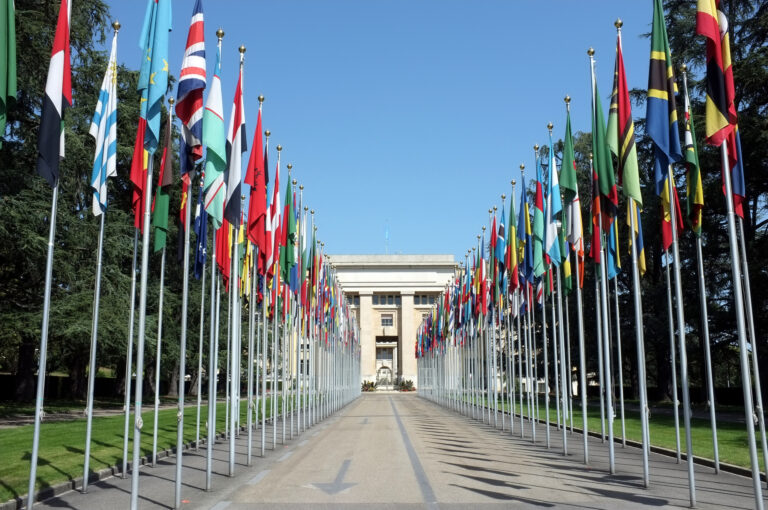
International law lags behind economic reality

by Mariëtte van Huijstee and Lydia de Leeuw
At the beginning of March, the UN Human Rights Council met in Geneva and the Dutch Parliamentary Committee on “Foreign Trade and Development Cooperation” met in The Hague. There was one common point on these meetings’ agendas: an internationally binding UN treaty to more effectively protect citizens in every part of the world from human rights abuses by businesses. Under such a treaty, multinationals would be held accountable on issues such as labour conditions, environmental damage or land grabbing. Such a treaty is needed to ensure that international law is aligned with global international reality.
No VIP rights for multinationals: human rights and environment first!
Last month, a British court ruled that Nigerian communities in the Niger Delta could not sue Shell for serious pollution caused by its Nigerian subsidiary, Shell Petroleum Development Company (SPDC). Although it was not unanimous, the British court found that Shell N.V. is not liable for pollution caused by its subsidiary and that the Nigerian victims would have to sue SPDC. In a related case, however, a Dutch court (in “Dooh & Milieudefensie vs. Shell & SPDC”) and EU court (in “Shell Petroleum NV vs. European Commission”) concluded that Shell has decisive influence as a parent company and is therefore legally liable. Very little can be expected from the Nigerian legal system: complex cases such as these can last as long as 20 years –referred to as “beyond catastrophic” by a British judge in the case “IPCO Limited vs. NNPC”. Even after many years of drawn-out court proceedings, acknowledgement and compensation for the victims has not been forthcoming.
Sign the petition for an UN Binding Treaty!(opens in new window)
As SOMO staff members, we see all too often how victims of corporate human rights abuses have limited or no access to legal means in cases against multinational enterprises. The international structure of multinational enterprises allows discrepancies between differing jurisdictions to be exploited. In view of increasing globalisation, the question arises how multinational enterprises can be brought to justice for abuses which extend beyond country borders. Many countries are not willing to amend their national legislation; stricter laws could be detrimental to the investment climate and their competitive advantage in relation to countries that do not take measures. An internationally legally binding agreement, on the other hand, could provide a basis for states to act collectively and to create a level playing field.
UN treaty process on business and human rights moving into a new phase
Opponents of a UN treaty often use the argument that legislation threatens consensus on the non-binding UN Guiding Principles on Business and Human Rights (UNGPs), which was unanimously endorsed by the UN Human Rights Council in 2011 We believe this is a false dichotomy. The UNGPs provide businesses and states with guiding principles on their respective responsibilities and duties to respect and protect human rights. However, as the word “guiding” indicates, these are voluntary guidelines for businesses and lack legal backing. A legally binding treaty would add the enforcement needed to make the UNGPs truly effective in bringing about change.
Until now, the EU has taken a hesitant and reactive approach in the UN treaty process. This is an incomprehensible position for the world’s third-largest economy, which positions itself as a champion of human rights. This weak performance stands in stark contrast to the EU’s proactive response to entering into trade and investment treaties. The principle of Investor–State Dispute Settlement (ISDS) is included in these treaties, which does include binding rulings for countries and businesses, and is intended to protect foreign investors from the ‘whims’ of the host country. As a consequence, investors are better protected by international law than citizens.
During the General Meeting of the Dutch Committee on ‘Foreign Trade and Development Cooperation’, Minister Sigrid Kaag expressed her support of the process intended to lead to a binding UN treaty. We are pleased with this assurance, considering that the Netherlands has not taken a position on the treaty until now and has hidden behind the EU. The Minister also stated that there are still many obstacles to overcome before a workable agreement can be achieved. That is true, and we therefore call upon the Dutch government to take a leading role in Europe and to work for an effective international agreement which will benefit victims of human rights abuses.
Do you need more information?
-

Lydia de Leeuw
Researcher

Related content
-
Welcome letter to Luis Gallegos Chiriboga: the new Chair-Rapporteur of the UN’s IGWGPosted in category:Published on:Statement
-
 UN treaty process on business and human rights moving into a new phasePosted in category:News
UN treaty process on business and human rights moving into a new phasePosted in category:News Lydia de LeeuwPublished on:
Lydia de LeeuwPublished on: -

